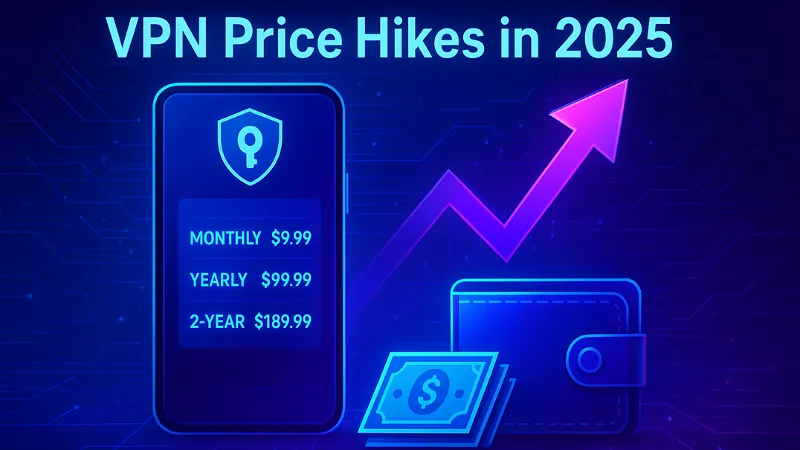Why VPN Prices Are Rising in 2025 and How to Cut Costs

Virtual Private Networks (VPNs) have become an essential part of our digital lives. Whether it’s for privacy, security, or accessing global content, millions of users now rely on VPNs daily. However, as 2025 unfolds, many VPN users have started noticing a sudden jump in subscription prices. But what’s driving this rise and more importantly how can you still protect your privacy without breaking the bank?
Why VPN Prices Are Increasing in 2025
Several factors are behind the growing cost of VPN services this year. Let’s look at the main reasons:
Rising Infrastructure Costs
VPN providers need global servers to offer fast and secure connections. These servers are hosted in data centers worldwide, and maintaining them has become more expensive due to inflation, electricity costs, and increasing demand for high-speed bandwidth. As user numbers grow and connections per account rise, providers face higher resource demands, leading to price adjustments.
Stronger Privacy Laws and Compliance Costs
With more countries tightening data protection regulations, VPN companies now invest heavily in legal compliance and transparency audits. These efforts protect users—but they also increase operational costs, making independent audits by firms like Deloitte a standard expense that gets passed on to subscribers.
Advanced Security Features
Modern VPNs offer much more than just encrypted tunnels. Features like multi-hop connections, malware protection, tracker blockers, and breach alerts have become standard. Developing and maintaining these advanced systems costs money and companies are passing part of that expense to users to keep pace with evolving threats like post-quantum encryption.
Market Competition and Rebranding
The VPN industry has grown crowded. To stand out, many companies are investing in rebranding, better app interfaces, and 24/7 live support. These improvements raise quality but also prices, especially for premium brands with heavy advertising.
Global Currency and Inflation Impact
Inflation has hit every sector, and the tech world is no exception. VPN providers that operate in multiple currencies have had to adjust prices to stay profitable, especially in regions where operational costs have risen sharply.
Average VPN Price Changes in 2025
According to market reports, leading VPN brands like ExpressVPN, NordVPN, and Surfshark have seen price increases ranging from 10% to 25%. While short-term plans are now more expensive, many brands still offer huge discounts for users who commit to longer subscriptions.
For example:
-
Monthly plans: $11–$15 per month (e.g., ExpressVPN at $12.95)
-
Annual plans: $3–$7 per month (e.g., NordVPN at $4.99, Surfshark at $3.19)
-
Two-year plans: $2–$4 per month (e.g., Surfshark at $1.99, NordVPN at $3.59)
So, even though prices have risen, long-term users still get excellent value.
How to Cut VPN Costs in 2025
Even with rising prices, there are still plenty of smart ways to save money while staying protected online.
a. Choose Long-Term Plans
Most VPNs reward long-term users. By choosing a 12-month or 24-month plan, you can save up to 80% compared to monthly payments.
b. Look for Seasonal Discounts
VPN companies often run special promotions during New Year, Black Friday, and Cyber Monday. Keep an eye out; these deals can make premium VPNs affordable.
c. Use Trusted Free VPN Trials
If you only need a VPN for short-term use, try free trials or money-back guarantees. Brands like ProtonVPN offer free tiers with decent speed and no data logging.
d. Bundle Deals and Student Discounts
Some VPNs partner with antivirus or password manager services for bundled deals. Others, like NordVPN and Surfshark, provide student discounts.
e. Share a Plan Securely
Many VPN subscriptions allow multiple device connections or family sharing. If you trust someone, splitting a plan can cut your cost by half or more.
Are VPNs Still Worth It in 2025?
Absolutely even with slightly higher prices, VPNs remain one of the most valuable digital tools today. A VPN helps you:
-
Protect against hackers on public Wi-Fi
-
Access geo-restricted streaming content
-
Keep your browsing private from ISPs and advertisers
-
Safeguard sensitive data while traveling or working remotely
Think of a VPN as an investment in digital safety that costs far less than the damage caused by data breaches or identity theft.
Final Thoughts
The rise in VPN prices in 2025 reflects a broader shift in the online privacy landscape. As the world becomes more connected and more vulnerable VPN providers are stepping up with stronger, smarter, and safer technology.
- Art
- Causes
- Crafts
- Dance
- Drinks
- Film
- Fitness
- Food
- Games
- Gardening
- Health
- Home
- Literature
- Music
- Networking
- Other
- Party
- Religion
- Shopping
- Sports
- Theater
- Wellness


